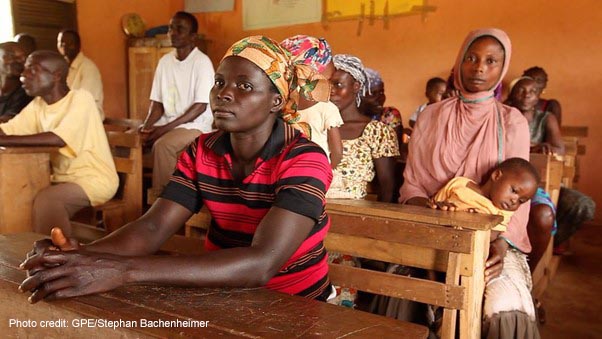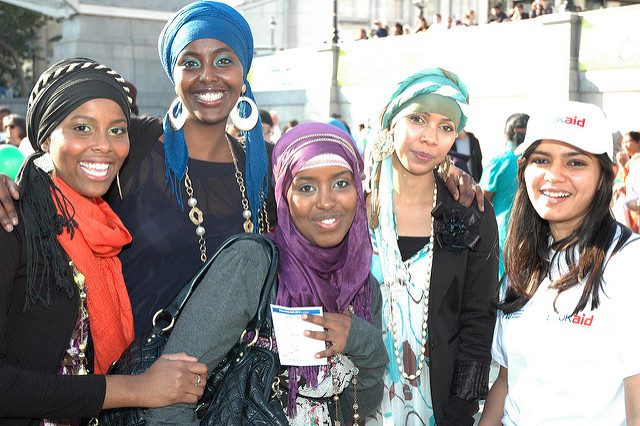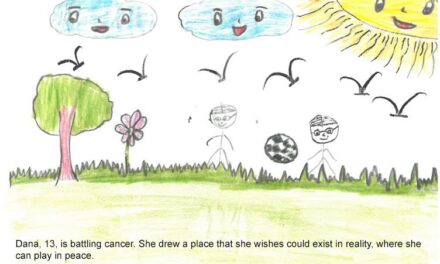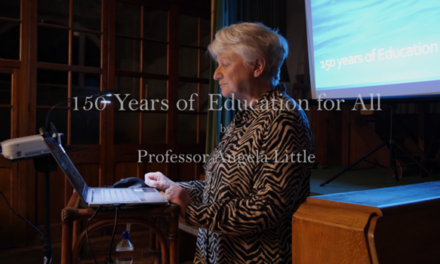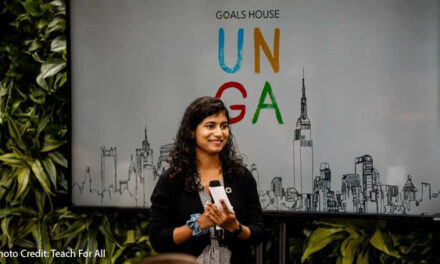This blog was written by Dr Leslie Casely-Hayford (Associates for Change, Ghana), Professor Ricardo Sabates Aysa (REAL Centre, University of Cambridge), Dr Adedeji, Center for the Study of the Economies of Africa and Fatu Yumkella, Dalan Development Consultants, Sierra Leone.
Civil society and non-governmental organisations (NGOs) have been central in supporting education for some of the most disadvantaged children in Sub-Saharan Africa. Many of these organisations collaborate with community leaders and parents to understand the persistent barriers to education which are faced by communities excluded from the conventional state-led education provision. Some of these barriers include the lack of schools within the vicinity, inadequate timing for educational provision, policies about enrolment based on age and location, inability to recruit trained teachers to under-resourced areas and teacher absenteeism, differences between official language of instruction and the communities main spoken languages, lack of school inputs including books, among others.
Within these contexts, the evidence from recent Knowledge and Innovation Exchange (KIX)/Global Partnership for Education (GPE)-supported research uncovered and identified strong capabilities among communities towards developing and sustaining their own educational provision. Local NGOs have been innovating on the educational provision that can serve children in these under-resourced areas which provide communities with education that is within their grasp. With a history of over 30 years, accelerated education has been one of such innovations which has proven to be effective at enhancing foundational skills in literacy and numeracy, typically at the level of third grade of primary education (see more information from the INEE AEWG). Evidence also demonstrates that accelerated education supports transitions into primary and junior secondary schools for the majority of children and that once in formal school, the progress for the majority of children who experienced accelerated learning is similar to that of children who have been attending government schools. Countries like Burkina Faso, Ethiopia, Ghana, Nigeria and Sierra Leone are all beginning to make investments into these alternative and complementary basic education provisions to ensure that no child is left behind.
Some of the key principles for educational delivery of accelerated education are: the use of mother-tongue education, the selection by the community of their own local facilitators to deliver instruction, timing of lessons which takes into consideration family farming responsibilities and other livelihoods needs, prioritising knowledge of national curricula but adapted to cater for the needs of older learners (8-15 years of age), use of local resources, and strong support and management from communities. Many of these accelerated education programmes have experienced cycles of expansion, mostly driven by funding from development partners. However, understanding the role of NGOs and civil society organisations in sustaining community-driven approaches to scaling these programmes remains relatively unknown. In this blog, we provide some of the key findings that have emerged from our research on Accelerated Education Programmes (AEPs) in Ghana, Nigeria, and Sierra Leone, supported by GPE/KIX/IDRC over the last 5 years. Several NGOs have been supporting this research, which form the basis for our findings.
Types of accelerated programmes
The accelerated education models in our contexts, which are mostly delivered by national NGOs, can be classified into three modalities. First are speed schools, which tend to condense the 6 years of primary school curricula into 2 to 3 years of accelerated instruction, with a strong focus on completing primary education. Pupils in the highest level of speed schools are encouraged to take part in the national examination to obtain their certificate of primary school completion. In essence, speed schools in this modality replaces primary schools. These models are primarily found in Ethiopia and Sierra Leone, in areas of extreme poverty and fragility.
The second modality are complementary accelerated models, which aim to condense only the first three years of the primary curricula, operate outside the formal system in mother tongue and support students to make the transition into government primary schools at Grades 3 or 4. These models are found in Burkina Faso, Ghana and Nigeria. For the particular case of Ghana, the model has been adopted by the Ministry of Education under its Complementary Education Authority.
Third are gendered empowerment models of accelerated education, usually focused on girls, and have an additional income generation component since they often target teenage mothers who have dropped out of school or never attended. Some of these models do not have a link to the formal school (or completion of a degree), but rather, their focus is to address factors that inhibit girls’ participation in education, psychosocial support and skills for livelihoods, income-generation and the world of work. These models are mostly operating in Ghana and Sierra Leone.
Key to scalability of accelerated education in these contexts is the role of NGOs and civil society organisations in supporting the government’s plans for adopting and adapting such models. We identified three particular roles:
- NGOs as the main provider of accelerated education
- NGOs and government as providers of accelerated education
- NGOs’ role as advocates for the provision of accelerated education
NGOs as main providers
The case of accelerated education in Borno State, Nigeria (and in some areas of Sierra Leone) represents a model of scalability, whereby local NGOs working in context of conflict and post-conflict are the main providers of AEPs. These programmes have received funding and support mainly from development partners/donors and to some extent, the state government. In Borno State, the spate of violent conflicts led to the destruction of more than 5,000 schools and over 1.8 million children displaced. Provision of education in such areas by the government is extremely expensive and sometimes not possible due to security reasons. Over the course of our research since 2019, accelerated education in Borno State has successfully supported the transition of one third of learners into government schools, with a slightly higher proportion of girls making this transition. Additionally, our results indicate that 45% of learners who transitioned into government school completed primary education. Our research demonstrates that one year of accelerated education in Borno State costs less than two-thirds the cost of schooling to get a child to primary 4 level.
Although NGOs in these regions are the main provider of AEPs, our results highlight the key role of regional and subregional government authorities in enabling the environment for provision. This has included enabling local NGOs to provide AEPs, validating the AEP curriculum, enabling external funding initiatives for AEP and, in some cases, supporting integration back from learners into government schools. Under this modality, any scalability aspect must consider the central role that NGOs are playing as providers and hence their potential for expansion, possibly through state partnerships.
NGOs and government as providers
In Sierra Leone, and previously in Ghana, the government has taken an active role to adapt and adopt accelerated education into their provision. In these cases, NGOs and government collaborate in supporting accelerated education, but the provision is independent. The government of Sierra Leone has been running AEPs for out-of-school children since 2014. The AEP initiative is managed by the Non-formal Education Directorate (NFED). Between 2014 and 2016, the NFED identified and enrolled 14,500 girls into 340 community learning centres and formal school facilities across all districts. The beneficiaries, mostly pregnant girls, were taught in the afternoons in four core subjects (Language Arts, Mathematics, Integrated Science and Social Studies). 10,000 of these girls (69%) were transitioned into the three levels in the education system, that is. primary, junior secondary and senior secondary schools. In 2017/18, 2,000 out-of-school girls in 13 districts were enrolled in the government driven AEP and all completed the programme, whilst 1,920 (96%) transitioned into primary, lower secondary and senior secondary schools. The remaining number (80), were enrolled in technical and vocational institutions. In 2022, NFED prepared 200 out-of-school girls in 11 districts, mostly girls with disabilities, pregnant girls or young lactating mothers, and most of them have now transitioned into various levels of the formal school system.
Sierra Leone’s model of accelerated education with gendered sensitive life skills and income generation provision has shown effectiveness in terms of enhancing foundational skills and supporting transition back into education particularly for girls. A key finding from our research is that 69% of the learners of accelerated programmes in Sierra Leone were participating at secondary school level and beyond. Due to this evidence, the Ministry of Education in Sierra Leone has agreed to support accelerated education provision for another 120,000 students as part of their provision through Qatar funding with support of NGOs for reaching this target. Under the modality, where accelerated education is offered by the government and NGOs, it is possible to achieve economies of scale, whereby NGO provision does not have to expand and contract to levels that are challenging to maintain. Rather, it works alongside government-adopted provision to achieve provision at scale.
NGOs role as advocates
The scalability of accelerated education in Ghana has taken a different form. Since 2019, the Ministry of Education in Ghana has adopted accelerated education, or what they term complementary basic education, as part of the Complementary Basic Education. A dedicated Complementary Education Authority, under the Ministry of Education, was established in 2021 to provide education for out-of-school children. Ghana has provided the policy frameworks and legislation for the delivery of complementary education, but the provision at the local level remains limited.
Findings from our interviews with community leaders indicates there is strong support for accelerated education such as the one which has benefitted communities for several years, but the government reach to scale up this approach is limited due to funding. Accelerated education in the regions of North and Upper East of Ghana, where our 32 research and intervention communities are located, has taken place for over 10 years. From our census of beneficiaries of accelerated education in these communities, we identified over 1,700 learners, most of whom benefitted from accelerated education between 2016 and 2019. These community leaders appreciated the role of local NGOs in the provision of accelerated education. We found an over 80% transition rate into formal school from the programme led by the Ghana Institute of Linguistics, Literacy and Bible Transition (GILLBT) and 86% for the established School for Life programme.
Our findings reflect a strong desire of communities to support educational programmes, but the speed of delivery from the government is stalled due to the lack of financial support. NGOs and civil society organisations have demonstrated their ability to advocate for AEP provision with local governments. In addition, NGOs have taken a role to mobilise communities for the provision of accelerated education. Local NGOs are starting to explore a sustained commitment by communities to provide in kind support for AEP provision so that government-led AEP programmes can be an option for children in these communities.
Concluding remarks: There is not a one-size-fits-all scalability
Scaling up education innovations is key to support education in areas of conflict, extreme poverty and remote rural areas of Sub-Saharan Africa, where state-led provision remains limited due mainly to funding. Political will is central to drive the scalability process, particularly when introducing an alternative pathway to education provision in Africa. But the role of education innovators, many of them local NGOs and civil society organisation is key for the successful adoption at scale and their sustainability at community and district levels. As demonstrated, there are cases where it is only through local providers that education is possible for children, such as areas of conflict and in extremely deprived rural areas. In other cases, political will is in the form of adaptation of key elements of accelerated education, yet not all elements of accelerated education are possible within government provision. And even in the case where the government has taken the lead to completely adopt accelerated education, civil society organisations are central to mobilising community support, ensuring sustained interest and bridging the implementation between government and communities.
The challenges of scaling and sustaining accelerated education require a more flexible approach with the adaptation. Such approaches require more flexible provision and the curriculum which accommodates the needs of learners who opt for accelerated education. Use of local facilitators and capacity building at the community level continues to be key to sustaining the possibilities that future generations can also benefit from this type of educational provision. Finally, we hope that data can be gathered to understand more deeply the long term benefits of accelerated education over the life course of these learners in SSA.
Acknowledgements
Funding for this project comes from the Global Partnership for Education Knowledge and Innovation Exchange, a joint endeavour with the International Development Research Centre, Canada.
Project title – Generating and Mobilising Innovative Knowledge for Regional Education Challenges KIX: A comparative study of accelerated education programs and girls-focused education models in Ghana, Nigeria, and Sierra Leone, GPE KIX (March 2021-2024).
Sources
More information about the evidence that has been generated via our projects can be found at Accelerated Education Programme – IDRC and Complementary Education.

